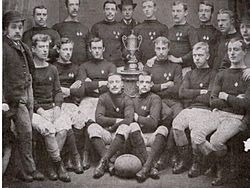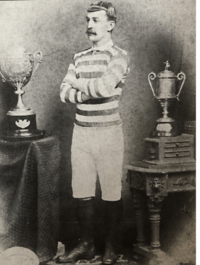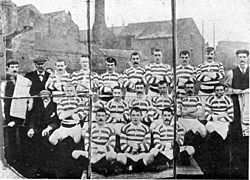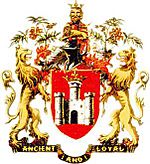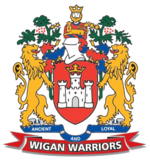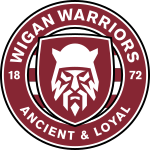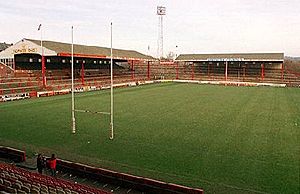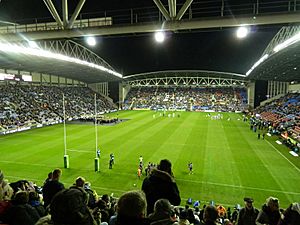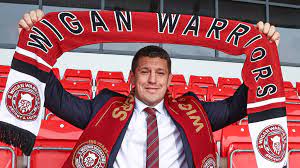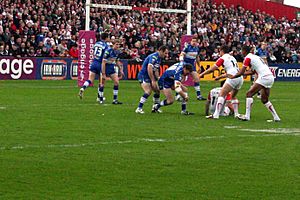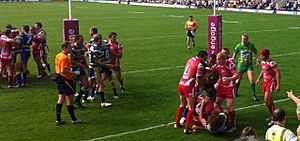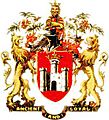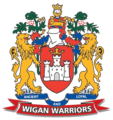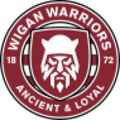Wigan Warriors facts for kids
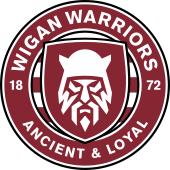 |
||||
| Club information | ||||
|---|---|---|---|---|
| Full name | Wigan Warriors Rugby League Football Club | |||
| Nickname(s) | The Cherry and Whites The Riversiders |
|||
| Website | wiganwarriors.com | |||
| Colours | Cherry and White | |||
| Founded | 1872 as Wigan Football Club 1879 (Re-formed) as Wigan Wasps Football Club |
|||
| Current details | ||||
| Ground(s) |
|
|||
| Chairman | Chris Brookes | |||
| Coach | Matt Peet | |||
| Captain | Liam Farrell | |||
| Competition | Super League | |||
| 2024 | 1st (Champions) | |||
| Uniforms | ||||
|
||||
| Records | ||||
| Championships | 24 (1909, 1922, 1926, 1934, 1946, 1947, 1950, 1952, 1960, 1987, 1990, 1991, 1992, 1993, 1994, 1995, 1996, 1998, 2010, 2013, 2016, 2018, 2023, 2024) | |||
| Challenge Cups | 21 (1924, 1929, 1948, 1951, 1958, 1959, 1965, 1985, 1988, 1989, 1990, 1991, 1992, 1993, 1994, 1995, 2002, 2011, 2013, 2022, 2024) | |||
| World Club Challenges | 5 (1987, 1991, 1994, 2017, 2024) | |||
| Other honours | 113 | |||
| Most capped | 774 - Jim Sullivan | |||
| Highest points scorer | 4,883 - Jim Sullivan | |||
The Wigan Warriors Rugby League Football Club is a professional rugby league team from Wigan, Greater Manchester, England. They play in the Super League, which is the top level of rugby league in Britain. The club started in 1872 and was one of the first teams to form the Northern Rugby Football Union in 1895.
Wigan Warriors are known as the most successful club in rugby league history. They have won a huge 163 trophies! Eight of these wins happened before the Northern Rugby Football Union was even created.
Since 1999, the Warriors have played their home games at the Brick Community Stadium. Before that, their home was Central Park from 1902. The team first wore their famous cherry and white colours in 1885. They made these their permanent colours in late 1888.
The club has won 24 league titles, 21 Challenge Cups, and 5 World Club Challenges. The 1980s and 1990s were a very successful time for Wigan. They won seven league titles in a row and eight Challenge Cup finals in a row (1988–1995). They also won the World Club Challenge three times, including a big win against the Brisbane Broncos in 1994. In 2024, Wigan had an amazing year, winning all four major trophies available to them!
Contents
History of Wigan Warriors
How the Club Started (1872–1902)
Wigan Football Club began on November 21, 1872. Members of the Wigan Cricket Club decided to start a football team. About 50 people joined, mostly from the cricket club. The first game was a practice match on November 30, which drew about 2,000 fans! Their first official match was in January 1873 against Warrington, ending in a draw.
In 1876, the club struggled to find enough players. Many players from Upholland Football Club joined, and the team changed its name to Wigan & District Football Club. They moved their home games to Prescott Street. However, the club stopped playing in late 1877.
The club was re-formed on September 22, 1879, as Wigan Wasps Football Club. New members, many from a running club, helped bring the team back. They returned to Folly Field for their games. In 1881, the club went back to its original name, Wigan Football Club.
Wigan won their first trophy, the Wigan Union Charity Cup, in 1883. They won it again in 1885. The team first wore cherry and white jerseys on September 26, 1885.
Some important players from this time included James 'Jim' Slevin, Ned Bullough, and William 'Billy' Atkinson. Jim Slevin played 290 games, scored 131 tries, and helped the club win 8 trophies.
In 1895, Wigan, Leigh, and Salford were suspended by the RFU. This was because they paid players for time off work, which the RFU saw as breaking amateur rules. To solve this, Wigan and other clubs from Yorkshire and Lancashire formed the Northern Union. This led to the creation of the sport we now know as rugby league.
Wigan played at Springfield Park from 1901 to 1902. They won the Lancashire Senior Competition during this time. Their biggest crowd at Springfield was 10,000 fans.
Moving to Central Park (1902–1980)
On September 6, 1902, Wigan played their first game at their new home, Central Park. About 9,000 fans watched them beat Batley 14–8.
In the 1905–06 season, Wigan won their first rugby league cup, the Lancashire County Cup. They continued to win many Lancashire League and Cup titles over the next few decades.
In 1921, Jim Sullivan joined Wigan at just 17 years old. He was a fantastic player and later became player-coach in 1932. He scored the first points in the first Challenge Cup Final played at Wembley Stadium in 1929, helping Wigan win 13–2.
Wigan won their first Challenge Cup in the 1923–24 season, beating Oldham 21–4. In 1933, the Prince of Wales visited Central Park, becoming the first royal to watch a rugby league match.
During World War II, Wigan continued to play in special wartime leagues. They went unbeaten in the 1940–41 season.
After the war, in 1948, Wigan played in the first-ever televised rugby league match. Their 8–3 Challenge Cup Final win over Bradford Northern was shown on TV. This game was also the first rugby league match attended by a reigning monarch, King George VI.
In 1953, Wigan signed Billy Boston for £150. He became one of the most famous Wigan players ever. Eric Ashton also joined in 1955. Wigan reached the Wembley final six times during their time, winning three.
On March 27, 1959, Central Park saw its biggest crowd ever: 47,747 fans watched Wigan beat St. Helens 19–14. This is still a record for any rugby league game in Lancashire.
Wigan continued to win trophies until 1974, when they had a period of eight seasons without a major win.
Relegation and Rise to Success (1980–1996)
In 1980, Wigan was relegated from the top league for the first time. They quickly earned promotion back the next season.
In the early 1980s, Maurice Lindsay joined the club's directors. Wigan became one of the first teams to become fully professional. This helped the club become much more successful.
Under new coach Graham Lowe, Wigan won a record 29 games in a row between February and October 1987. They also beat Australian club Manly-Warringah 8–2 in the 1987 World Club Challenge at Central Park. This was a big moment, as it was the first time an English club had beaten an Australian team in rugby league since 1978.
From 1988 to 1995, Wigan had their most successful period. They won the Challenge Cup eight times in a row! This included a 27–0 win over St Helens in 1989, where St Helens didn't score any points. They also won the Championship seven times and three World Club Challenges.
In 1994, coach Graeme West led Wigan to win the First Division Premiership Trophy. They then traveled to Brisbane and won the 1994 World Club Challenge against the Brisbane Broncos in front of a record 54,220 fans. At the end of that season, Wigan won the League Championship, Challenge Cup, Regal Trophy, and Premiership. This was a "Grand Slam" of all four trophies, a feat they repeated in 2024.
The Modern Era (1996–Present)
In 1996, Wigan played two special matches against Bath RFC. One game was played under rugby league rules (Wigan won 82–6), and the other under rugby union rules (Wigan lost 44–19).
In 1997, the club changed its name to Wigan Warriors. In 1998, Wigan reached the Challenge Cup final but lost 17–8 to the Sheffield Eagles, which was a big surprise. However, they went on to win the first-ever Super League Grand Final that year, beating Leeds 10–4 at Old Trafford.
In November 1999, the Warriors moved to the new JJB Stadium (now called the Brick Community Stadium). Their last game at Central Park was an emotional win against rivals St Helens.
In 2002, Wigan won their 17th Challenge Cup, beating St Helens 21–12 at Murrayfield Stadium. Kris Radlinski was named player of the match.
The club went through some tough years, including a period where they struggled to win games. In 2006, Brian Noble became coach and helped stabilize the team.
In 2007, Ian Lenagan bought a large part of the club. The team improved, reaching the play-offs. In 2008, they finished fourth in the Super League.
Michael Maguire became head coach in 2010. He quickly turned the team around. Wigan won the League Leaders Shield and then defeated St Helens 22–10 in the Grand Final at Old Trafford. This was their first league championship since 1998. Many Wigan players and Maguire won awards that year.
In 2011, Wigan won their first Challenge Cup at Wembley Stadium since 1995, beating Leeds Rhinos 28–18.
Shaun Wane took over as coach in 2012. Wigan won the League Leaders Shield that year. In 2013, they had a fantastic year, winning both the Challenge Cup (beating Hull F.C. 16–0) and the Super League Grand Final (beating Warrington Wolves 30–16). This was their first "League and Cup double" since 1995.
Wigan reached the Grand Final in 2014 and 2015 but lost both times. However, in 2016, they won their fourth Super League title, beating Warrington Wolves 12–6.
2017 was a mixed season. Wigan won their fourth 2017 World Club Challenge against Cronulla Sharks. But they struggled in the league, missing the play-offs. They also lost the Challenge Cup Final to Hull F.C..
In 2018, Wigan had a great year. They won 7 out of 7 Super 8s matches, including a big win against St Helens. They reached the Grand Final again and beat Warrington Wolves 12–4, winning their fifth Grand Final. This was coach Shaun Wane's last game, and he left as the most successful Wigan coach of the modern era.
Adrian Lam became coach in 2019. Wigan lost the 2019 World Club Challenge to Sydney Roosters. In 2020, despite the COVID-19 pandemic, Wigan won the League Leaders Shield and reached the Grand Final. In a very close game, they lost to St Helens in the final seconds.
Matt Peet became head coach in October 2021, with Shaun Wane returning in a director role. In 2022, Wigan won their 20th Challenge Cup in a tight 16–14 victory over Huddersfield Giants at the Tottenham Hotspur Stadium.
In 2023, Wigan had a strong finish to the season. They won 10 games in a row, including a big 50–0 win against Leeds Rhinos. They won the League Leaders Shield and then beat Catalans Dragons 10–2 in the Grand Final, claiming their sixth Super League title. Bevan French was named Steve Prescott Man of Steel for 2023.
In 2024, Wigan had an incredible year, winning all four major trophies! They beat Penrith Panthers in the 2024 World Club Challenge to win their fifth title. They then won the Challenge Cup against Warrington Wolves at Wembley Stadium. Later, they kept the League Leaders Shield and won the 2024 Super League Grand Final against Hull Kingston Rovers 9–2. This was the first time a team had won all four major trophies in the modern era.
The 2025 season started with a close loss to Leigh Leopards, but Wigan then beat Warrington Wolves in a game played in Las Vegas. Their defense of the Challenge Cup ended with a home loss to Hull F.C..
Club Name
The club started as Wigan Football Club in 1872. When it re-formed in 1879, it was called Wigan Wasps Football Club. The "Wasps" part was dropped in 1881, and it became Wigan Football Club again. As rugby league grew, the club became Wigan Rugby League Football Club, often shortened to Wigan RLFC or Wigan RL. In 1997, the club added "Warriors" to its name, becoming Wigan Warriors. People still often just call the team "Wigan."
Team Colours
The colours cherry and white are strongly linked to the club. Since 1888, the home kits have mostly been cherry and white, usually with hoops. The team first wore these colours on September 19, 1885. Before 1888, Wigan wore different colours, including blue and white hoops, black jerseys, and even chocolate and coral hoops.
For most of the 20th century, the team wore classic cherry and white hooped jerseys with white shorts. In recent years, the designs have become more varied, sometimes using darker shades of red and red shorts instead of white.
Since 2022, Wigan has also created a third kit each year. A part of the money from these sales goes to charity. For 2025, the third kit is lilac, supporting Wigan & Leigh Hospice.
Club Badge
Wigan has used a version of the coat of arms of Wigan Borough as its club badge for a long time. This crest first appeared on the playing jerseys for the 1948 Challenge Cup Final. It became a permanent feature on the jerseys in 1984.
The coat of arms is very old and special. It includes symbols like a king's head and a royal lion, showing Wigan's history and loyalty to the crown. The motto "Ancient and Loyal" also comes from the town's history.
On November 1, 2020, the club changed its badge to a new design. This new badge was inspired by the Brigantes, an ancient Celtic tribe who lived in Northern England, including Wigan. The Brigantes name is also used by some of the club's most passionate fans.
The new badge also includes a shield from the old crest and the "Ancient & Loyal" motto. Its round shape is like the Northern soul music logo, which was popular in Wigan. The famous cherry and white hoops are also part of the new badge, along with the club's founding date.
Kit Sponsors
The current kit manufacturer for 2025 is Kappa. The main shirt sponsor is Greenmount Projects.
Teams at Wigan Warriors
Besides the main men's team, Wigan Warriors has many other teams:
- Reserves
- Academy (for players under 18)
- Scholarship (for players under 16)
- College development squad (for men and women aged 16–18)
- Women's first team
- Women's academy (for players under 19)
- Physical disability team
- Learning disability team
- Wheelchair team
- Wheelchair A (reserve wheelchair team)
- Touch Rugby team
Stadiums and Training
Early Homes (Before 1902)
Wigan Football Club first played at Folly Field. Later, as Wigan & District Football Club, they played at Prescott Street. When the club re-formed as Wigan Wasps, they returned to Folly Field before moving back to Prescott Street.
From 1901 to 1902, Wigan played at Springfield Park, sharing it with Wigan United A.F.C.
Central Park (1902–1999)
In 1902, Wigan moved to their own rugby ground, Central Park. It was their home until 1999. Central Park became very famous as Wigan grew into one of the world's top rugby league clubs.
The record attendance at Central Park was 47,747 fans for a game against St Helens in 1959.
The Brick Community Stadium (1999–Present)
Towards the end of the 1999 season, Wigan Warriors moved to the new JJB Stadium, which is now called the Brick Community Stadium. They share this stadium with the football club Wigan Athletic. The stadium can hold 25,133 people. The Warriors' record attendance there is 25,004, set against St Helens in 2005.
Wigan's training ground is the Robin Park Arena, right next to the Brick Community Stadium. This facility has been greatly improved and is considered one of the best training grounds in rugby league.
Coaches
Current Coaching Staff
Matt Peet is the current head coach of the Wigan Warriors. Former Wigan players Sean O'Loughlin and Tommy Leuluai are his assistant coaches.
Honours and Trophies
Wigan Warriors have won many important trophies throughout their history:
League Titles
- First Division / Super League Winners (24): This is the main league championship. Wigan has won it 24 times, including in 2023 and 2024.
- League Leaders' Shield Winners (5): This trophy is given to the team that finishes first in the league table before the play-offs. Wigan won it in 2010, 2012, 2020, 2023, and 2024.
- Premiership Winners (6): This was another championship trophy played for in the past.
Domestic Cups
- Challenge Cup Winners (21): This is a famous knockout cup competition. Wigan has won it 21 times, most recently in 2022 and 2024.
- Lancashire Cup Winners (21): A regional cup competition that Wigan dominated.
- League Cup Winners (8): Another cup competition from earlier times.
- Charity Shield Winners (4): A match played between top teams.
International Cups
- World Club Challenge Winners (5): This is a special game between the champions of the Super League and the Australian NRL. Wigan has won it 5 times, including in 2024.
Club Records
Individual Player Records
- Most tries in a match: 10 by Martin Offiah (1992) and Shaun Edwards (1992).
- Most points in a season: 462 by Pat Richards (2010).
- Most career tries: 478 by Billy Boston.
- Most career appearances: 774 by Jim Sullivan.
- Most decorated player: Shaun Edwards, who won 8 Championships, 9 Challenge Cups, and 3 World Club Challenges.
Team Records
- Biggest victory (All Time): 116–0 against Flimby & Fothergill (1925).
- Highest attendance (Central Park): 47,747 against St. Helens (1959).
- Highest attendance (all-time): 99,801 against Hull F.C. at Wembley Stadium (1985 Challenge Cup Final).
- Most trophies in one season: 4 in 2024 (Super League, League Leaders Shield, Challenge Cup, World Club Challenge).
Academy and Youth Development
Wigan is very proud of its academy and youth system. It's known as one of the best in the UK for developing young rugby league players. Many players who come through Wigan's youth system go on to play for the first team or for other top clubs. The club focuses on having many homegrown players in its main squad.
Supporters
Wigan Warriors have a large and loyal fan base. In the 1880s, home games often attracted over 7,000 fans. Fans would even travel by train to away matches in large numbers.
In 2006, when the team was struggling, home attendances actually increased as fans came out to show their support. From 2010 to 2012, Wigan was officially the best-supported club in the Super League, with higher average attendances than other top teams.
As a thank you to their fans, Wigan started dedicating the squad number 18 to them each season. This shows how much the club values its loyal supporters.
Wigan fans have a supporters club called The Riversiders. They meet regularly and often have special guests like players and coaches. Another fan group, the Wigan Brigantes, works to improve the atmosphere at games with flags and chants.
Wigan fans and people from Wigan are sometimes called 'pie eaters' or 'pies'. This nickname comes from the 1926 General Strike, when Wigan miners returned to work earlier than miners in other towns.
Rivalries
St Helens
Wigan's biggest and most intense rivalry is with St Helens. Games between these two teams are often played on Good Friday. The first match between them was in 1895 and ended in a 0–0 draw.
Both clubs are very successful and often compete for trophies. Wigan has a better overall record against St Helens, winning 206 matches compared to St Helens' 138. The last game between them was on April 18, 2025, with Wigan winning 24–14.
Leigh Leopards
The Leigh Leopards are another local rival, as both clubs are in the same area of Wigan. These games are called local derbies.
This rivalry hasn't always been as strong because the teams often played in different leagues. However, in recent years, the rivalry has grown, especially in 2023 when both clubs had successful seasons. This rivalry is sometimes called 'The Battle of the Borough'.
Wigan has won 155 matches against Leigh, while Leigh has won 57. The last meeting was on July 4, 2025, with Leigh winning 18–8.
Warrington Wolves
Wigan also has a strong rivalry with their neighbours, the Warrington Wolves. This rivalry has become more intense since the late 2000s, as Warrington has become a top team. The two clubs play annually for the Locker Cup.
Wigan has beaten Warrington in all five major finals they've played against each other (two Challenge Cup Finals and three Super League Grand Finals). Wigan fans often remind Warrington fans that their club hasn't won the main championship since 1955.
Wigan has a better head-to-head record, with 190 wins compared to Warrington's 126. The last game was on May 4, 2025, with Wigan winning 22–20. In March 2025, Wigan and Warrington played the first-ever Super League game in the United States, with Wigan winning 48–24 in Las Vegas.
Leeds Rhinos
Wigan also has a notable rivalry with Leeds Rhinos. Both clubs are very successful and have many supporters.
Between 2007 and 2018, either Leeds or Wigan won almost every Super League Grand Final. They have only met once in a Grand Final at Old Trafford, with Leeds winning in 2015. However, Wigan has beaten Leeds in three Challenge Cup Finals and the 1998 Super League Grand Final.
Wigan has won 156 games against Leeds, while Leeds has won 107. The last match between the two clubs resulted in a 12–10 win for Leeds.
In the Community
Wigan Warriors do a lot of work in the community through their charitable foundation, the Wigan Warriors Community Foundation. They work with local rugby clubs and schools. They have a program called 'Lessons for Life' that teaches young people about rugby league.
Wigan was the first club in the country to receive Sport England's Clubmark Gold Award. This award shows the club's strong commitment to looking after children, providing good coaching, and managing the club well.
The club has also partnered with ProCo to create a work-based learning academy. This academy, named "Central Park," helps young people and provides a base for the club's academy teams.
Images for kids
See also
 In Spanish: Wigan Warriors para niños
In Spanish: Wigan Warriors para niños
 | James Van Der Zee |
 | Alma Thomas |
 | Ellis Wilson |
 | Margaret Taylor-Burroughs |


